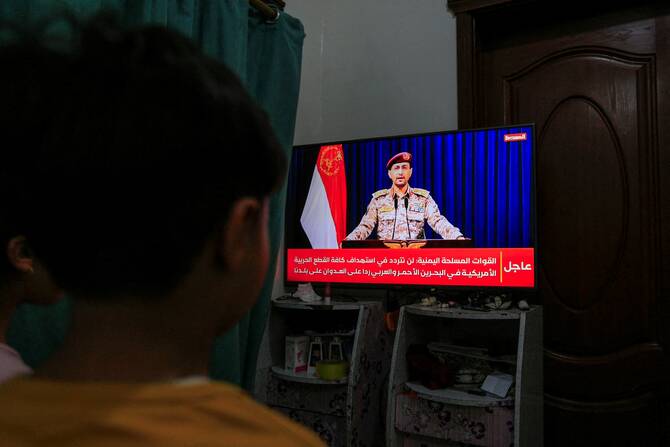Houthi attacks and Israeli responses
 Yemenis in Sanaa watch a statement by Houthi military spokesman Yahya Saree announcing the group launched an attack. (AFP)
Yemenis in Sanaa watch a statement by Houthi military spokesman Yahya Saree announcing the group launched an attack. (AFP)
In late August, Israel launched a new phase of confrontation with the Houthi group, as it targeted a command operations room in the Yemeni capital, Sanaa, killing Prime Minister Ahmed Ghaleb Nasser Al-Rahawi and several members of the Houthi government. The operation, backed by intelligence efforts, marked a strategic shift from a limited maritime confrontation to direct strikes targeting Houthi political and administrative leaders. Israeli Defense Minister Israel Katz described the operation as a “crushing blow.”
Abdul-Malik Al-Houthi’s response did not take long, as he sought in a speech to raise the morale of his supporters, considering that “the assassination of civilian ministers will not weaken Yemen but will rather increase its determination and steadfastness.” Meanwhile, Acting Prime Minister Mohammed Ahmed Muftah vowed revenge, accusing Washington and Tel Aviv of leading an “intelligence empire” that had infiltrated Yemen.
In the days that followed the Israeli strike and the accompanying mobilization on both sides, tensions continued to mount, as the Houthis in Sanaa buried 12 officials, followed by the launch of missiles and drones toward Israel. The Israeli army announced the interception of one missile on Sept. 3 after an alert in Tel Aviv, while another was reported to have fallen in an open area. At the same time, the Houthis announced they had targeted the oil tanker Scarlet Ray in the Red Sea, a step that raised great concern, especially since it poses a threat to energy security and navigation in the Red Sea and raises the risk level.
The Israeli response to the Houthis was not limited to the airstrike but included escalatory symbolic rhetoric. Katz threatened to unleash the biblical plagues on the Houthis, affirming that Israel “will complete all 10 plagues” until the threat is eliminated. This rhetoric reflects a desire for psychological deterrence as well as physical, especially since some Houthi missiles have reached sensitive areas inside Israel. But this rhetoric does not obscure the challenge Tel Aviv faces, as every Israeli airstrike means the possibility of a new Houthi response, even if limited, extending the war of attrition and increasing the likelihood of escalation, including the targeting of new areas.
Despite the above, researcher April Longley Alley of the Washington Institute for Near East Policy pointed out that “none of the dead were Houthi military or political decision-makers. In fact, the majority of these officials … were not part of the Houthi movement at all .” She added: “In effect, the Israelis eliminated a largely figurehead government.” This description raises a question about the strike’s effectiveness and whether it enhanced deterrence or instead gave the Houthis a pretext to tighten their internal grip and unify their supporters against an external enemy that all Yemenis share a hatred for.
The option pursued by the Houthis of expanding the maritime confrontation will multiply the risks to global trade.
Hassan Al-Mustafa
In light of these developments, the options before the Houthis seem complicated. Continued escalation with missiles and drones establishes them as the last active faction in the so-called Axis of Resistance, after Iran, Lebanon’s Hezbollah and the Iraqi factions ceased targeting Israel and Hamas and Islamic Jihad lost their ability to strike Tel Aviv. This grants the Houthis a symbolic gain but also places them under increasing Israeli strikes and mounting humanitarian pressures, especially with the spread of cholera and the decline of the health system’s capacity in the areas they control.
Also, the option pursued by the Houthis of expanding the maritime confrontation will multiply the risks to global trade and may call for intervention by an international coalition, which could impose suffocating isolation on them. On the other hand, tactical de-escalation represents an opportunity to regroup, but it may weaken their popularity at home and force them to confront the economic and service-related problems Yemenis suffer from.
Israel also faces a dilemma. Continuing the “decapitation” strategy grants it the image of a power capable of penetrating Sanaa, but it does not stop the threat to navigation or guarantee halting the missiles, particularly since Israeli intelligence on the Houthis is not of the same quality as that which it has on Hezbollah or Hamas. Likewise, expanding the targeting to include infrastructure could exacerbate the humanitarian crisis and expose Israel to international criticism. As for betting on the factor of time, it is tied to its ability to bear the cost of military operations thousands of kilometers away amid other regional priorities.
The US, despite its clear support for Israeli Prime Minister Benjamin Netanyahu’s government, has nevertheless given signals of preferring the political path. In May, President Donald Trump announced that “we will stop the bombings” after reaching an understanding with the group to halt its attacks on American ships. But any new Houthi escalation could bring Washington back to military options to protect navigation, especially if its direct interests are put at risk.
This complex military and political reality makes it clear that Israeli strikes alone will not grant Tel Aviv security, just as a Houthi escalation will not entrench legitimacy for the group. The most realistic path is through parallel tracks, which include ending the war in Gaza as the broader spark, protecting international navigation in the Red Sea and launching an inclusive Yemeni political process in which the Houthis return as a political player and not a rebellious armed faction. Without these steps, the region will remain hostage to a vicious cycle of escalation that threatens its political and economic future.
Hassan Al-Mustafa is a Saudi writer and researcher interested in Islamic movements, the development of religious discourse and the relationship between the Gulf Cooperation Council states and Iran. X: @Halmustafa
Disclaimer: Views expressed by writers in this section are their own and do not necessarily reflect Arab News’ point of view

